Theatre Reviews
ABSENCE OF SEPARATION - Theatre Ellipsis
Theatre Ellipsis is a brand new group billed as a physical theatre company producing new and original work. This production sees Matt Rothwell play John and Ben Moores play ‘the brain’s admin department’.
Absence of Separation questions what is the meaning of life, the purpose of humans and the co-existence of everything and the existence of nothing. The play touches on Vedanta Hinduism, Zen Buddhism, spirituality, contemporary society, depression, consciousness, psychology, dreams, addiction and fairy tales.
As we enter the Pauper’s Pit we are greeted by the droning sound of the bagpipes and the two actors motionless at the side of the stage. They then started to sing with a haunting quality about transformation. John has a fall in the shower and as a result, is in the place between life and death where decisions are made.
There is a real intensity about and commitment to this piece by the two actors who work tirelessly throughout this show. I liked the development of John’s character and his growing enlightenment. Ben Moores has an excellent unsettled quality to his character. There were some good moments. I do however think that the play is overlong and even with the chalk drawings and the dancing and the cup, this played more like a drunken philosophical conversation late at night than a piece of theatre that the audience could really connect with.
I did appreciate the fact they were trying to push the boundaries. However, this play contains many, many, many words. So many that it is hard to follow the logic, if indeed logic even exists or is merely a concept. There is no time to think and digest the ideas that are being thrown out there. I think their physical theatre skills should have been utilised to a greater extent. Movement could have said so much more and been more powerful than the constant barrage of language.
What should a person do with their life…is there any meaning to it? Who really knows? You need to go deeper than words they said. But the words just kept on coming and coming and coming.
If you want to see a piece of theatre that offers you lots of words and a cup as a concept then this is the show for you! I may never get the vision out of my head of a man in a Lycra body suit stroking an Adidas trainer whilst repeating that ‘chickens have elbows’!!! This reviewer needs a lie down, if in fact my bed really exists!
Jayne Marling
AFTER WE DANCED - NoLogoProductions

This accomplished group of actors have created a thoroughly enjoyable play about a couple who met on the beach one summer in 1952 and should have spent the rest of their lives together had fate not taken an unexpected twist.
Emily Florence Hutchings and Peter Pearson are instantly convincing as the starstruck lovers, Fran and Finn, so very much in love as they ballroom dance together, but things never become overly sentimental thanks to the strong thread of humour in writer/director Andy Moseley’s script. We learn how Finn, a fairground worker and ballroom enthusiast, mischievously pretends to be playing a game of football in order to accidentally-on-purpose kick a ball into Fran’s lap. And we learn how Fran is cute enough to know exactly what his real game is and to play along prettily.
As a teasing flirtation quickly turns into romance, we begin to have hints that Fran is hiding a secret that could threaten their future together but just as they seem to be overcoming this obstacle, tragedy strikes and with it a terrible blow to Fran’s sense of self-worth.
It is not a spoiler to say that they do eventually get together in old age because the tale is told in flashback with Finn’s son, John (Math Sams), acting as best man at their wedding, his speech exploring their tortuous relationship. Andrew Jefferson-Tierney is hilarious as Fran’s son Brad, drunkenly heckling John, tut-tutted by his wife Jen (Joanna Pope). Math Sams should also be given credit for successfully playing his part at very short notice after the late withdrawal of a member of the original cast. Cleverly, he hides any hesitation with best man nerves and when he refers to his script, it seems only that he is looking at his speech.
This is what some audiences might call (with relief) a “proper play”, with costumes, simple sets, well-chosen music and film footage adding to the period feel. While it may not be quite pacy enough for all tastes, this is a production with real heart, proving gentle, touching and amusing by turns.
Stephanie Billen
BREAKING THE RULES - The Marian Consort
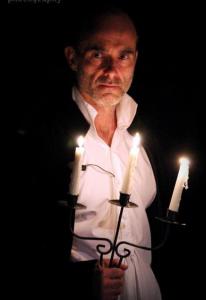
St John's Church, 22nd July
We know that Beethoven went deaf, that Schubert contracted syphilis and that Gesualdo murdered his wife. Bits of gossip become part of our collective consciousness but often we find that these fragments, these facts, are without context. Breaking the Rules is a wonderful and beautiful attempt to tell us more about the murderer Carlo Gesualdo (1566-1613. This musical drama coincides with the 450th anniversary of his birth - a date agreed on relatively recently by scholars).
The drama is set on the last day of Gesualdo's life. He is living alone and he is recalling his sinful life. Whilst he has written much heavenly vocal music to the glory of God he has an uneasy relationship with Him. Gesualdo anticipates being condemned to purgatory. Not only did he brutally murder his first wife and her lover - finding them in bed together - he has treated his second wife cruelly and been repeatedly adulterous. Just two weeks ago his only surviving son died; a depressed, bitter and angry Gesualdo faces death knowing he has no heir and at odds with his maker.
For Breaking the Rules we have a narrative given to Gesualdo (compellingly acted and performed by Gerald Kyd) surrounded by the six voices of the Marian Consort singing from his sacred music and his madrigals.
The Marian Consort is young but has rapidly acquired a reputation for the sheer quality of its singing and performance. The music of Gesualdo is wondrous to listen to but not easy to sing. Moreover the Consort made full use of the generous space in St John's Church processing singly at across the body of the church whilst singing perfectly.
This was a memorable performance - not only for the richness of the music but also for the insight offered into the difficult personal life of the composer. The text was written by Clare Norbury and Natalie Rowland and Pitchblack Lighting provided images projected onto the church organ.
Keith Savage
�
CLOAKS - fishhouse theatre
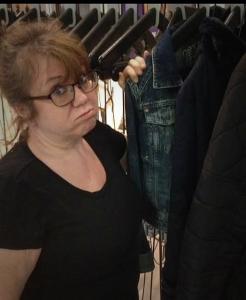
Lesley Emery plays Kath, a theatre cloakroom attendant introduces us to the theatre and starts out with some amusing observations on the type of customers and coats compared to the production; an element which rang very true with the audience as they laughed out loud! Sam (Charlotte Bond) is the runner, who chats away about her plans with the army, the world and for the future. There is a lovely bond between the two of them; Kath is clearly fond of Sam in a motherly way and expresses her fears for her in Iraq and Afghanistan. Sam’s youthful outlook that it is adventure and excitement forces Kath to reflect on her past and the hopes and plans for the future that she had at the same age.
The play very cleverly uses the coats as characters to transport you into Kath’s past, along with a very versatile Charlotte Bond, who supports this transition. Thus taking you on a tender journey of love, hope and disappointment, which is both very emotional and very funny.
I love this sort of play where the ability and skill of just two actors can bring to life lots of different characters so you are immersed in the story line totally. Lesley Emery brought such emotion to the role, your heart went out to Kath. There are also some very funny parts particularly on ‘the first time’ ‘wooed by Wham’ and how many McDs there may be in the world! You will have to go and see it to see what I mean!
Highly recommended, excellent acting and script and I look forward to seeing a lot more of these productions.
Sandra J Cooper
THE COMMUNIST THREAT - Rusted Dust
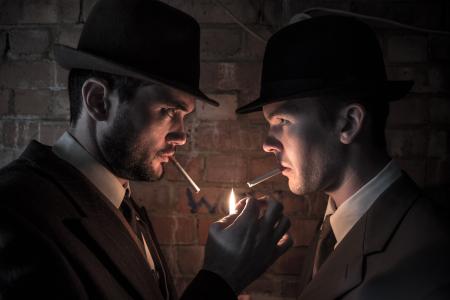
The Communist Threat takes you into the world of the Cambridge Spies, the Third Man and Smiley's people. Two men meet to arrange an assassination and pass the time until the target arrives. The men clearly come from very different backgrounds and their conversation reflect everyday assumptions about those backgrounds. But during the course of the play it becomes clear these men are hiding secrets and are not what they seem on the surface.
The play has fast moving dialog that carries you along. It is very easy and enjoyable to watch. The dynamics between the characters change as the play proceeds starting off as mild class tension and ending as a matter of life and death.
The play was created by the two performers David Holmes and Kieran O'Rourke. The writing is an excellent piece of fast paced verbal gymnastics in the style of David Hare and Tom Stoppard and the actors are both quite riveting. Overall the performance leaves the audience totally engaged and wanting more.
Alex Watts
THE CONDUCTOR - Raving Mask

At United Reform Church 20th then Fri, Sat, Sun 21, 22 and 23 July, all at 7.30pm
This is a fine show. It appears as “theatre” in the lists, and for most audiences that usually implies text and the spoken word. This piece is about music, and contains a great deal of it. In particular, Shostakovich, and his 7th Symphony, the one which was completed for and to celebrate the city of Leningrad in 1942, and played there by a much-reduced Leningrad Radio Orchestra during the 900-day siege of the city.
On the face of it, the play is about the conductor Karl Eliasberg who both admires and resents the ability of the famous composer, and about that relationship; in the context where Shostakovich has written the first two movements (to enormous appreciation and envy from Eliasberg), but then escaped the siege (not just the brutal effects of the siege itself but also the threatening politics of the time), while Eliasberg remains in the beleaguered city trying to coach his weakening orchestra so as to strengthen morale in the city by playing, for instance, the 1812 overture. How the Symphony was completed, played in Moscow, and then New York under Toscanini (that performance didn’t please Shostakovich, as it happens) and then reached Leningrad for a brave, emotional, stirring, defiant performance is the stuff of legend, and is well described here.
A company of three gave us the story, Joe Skelton as Eliasberg, Danny Wallington as Shostakovich himself, and Deborah Wastell as a range of five female characters – from composer’s wife to Head of the Culture Committee to – long-delayed – love interest. The star of the show is variously Shostakovich himself, Danny Wallington and the grand piano on which he so strongly gives us both incidental music (Shostakovich, of course) to underpin parts of the narrative and a powerful, sterling, performance of a piano version of the first movement. Whether this is the version Shostakovich himself created in 1941 doesn’t matter: this was a tremendous performance, full of energy and the music’s own emotion.
Joe Skelton as Eliasberg is the in-character narrator, filling in the events and the background: there is little interaction with Shostakovich, and just a few short scenes with the various female characters: the result is that he spends a great deal of time just standing, listening. The piano solo mentioned above must be all of ten minutes, and that’s a lot of time to stand there listening to the music and trying to show us increasing warmth, enthusiasm and excitement: in the event he didn’t seem to show us much.
The play is based on a novel by Sarah Quigley but is strongly rooted in fact. Those who already have an understanding of the siege will have learned little: others will come away much wiser. The reasons underlying Eliasberg’s troubled relationship with Shostakovich are dealt with early on, by narrative, but there is little emotion brought out at that stage nor shown developing. That said, the emotion is conveyed by the music itself, and it is put into a well-described context, and in a splendid abstract setting with a very effective lighting plot.
Those who like / enjoy / appreciate the music of Shostakovich should find this a treat: there’s a lot to listen to on the piano, and it sounds magnificent. I did wonder, however, why, once the play had come to its end, we were left with ten minutes of a full orchestral version, half without the house lights and then with: we weren’t given the most climactic, or the most emotional, elements of the symphony, and there was nothing to watch. The story had been well told by then, and this seemed just a little bit of a let-down.
Michael Quine
CREED - Shadow Syndicate

It is a given in linguistic theory that language is by nature ambiguous, and words inherently subject to interpretation and, unfortunately, misinterpretation. For any playwright –- in this particular case, a group of young playwrights -- to turn this and related ideas into drama without falling into ho-hum proselytizing is no mean feat.
CREED avoids the pitfall. Indeed, it delivers! Get a ticket as soon as you can for this SOLD OUT show!
The 8 young cast members, aged 14 to 18, present a riveting performance that keeps the audience fully absorbed. The plot moves at a galloping pace forwards and backwards, from 1926 to troubled contemporary times. It opens in a classroom with what could have easily been the usual cliché-trap: a dedicated teacher being given the sack for teaching unauthorized material. Instead, we move quickly from one situation to another, each echoing an event from our digitally-addicted life, carried forwards or back by a highly energized cast -–one is tempted to say electrified!—- to the contemplation of what humans have wrought in the name of following their creed.
The writers –- the play is a collective effort by the young group -— cleverly avoid naming any one creed, secular or religious, and thus cover all ideologies that have shaped human history either by our faithful adherence to it, or equally faithful detraction from it. In either case, questionable actions result. The followers and detractors righteously claim to be the guardians of the Word, the creed’s truth... and thereby hangs a tale of man’s inhumanity to man. Violence, twisted brainwashing, the sudden appearance of masked death-merchants, and missionaries of historical “truth” gleaned from unverified blogs: it’s all there in a powerful projection of our private and public lives.
Go see CREED! And take away with you a mirror-image of our behaviour and pithy truths (It’s not only what a creed does to people but what people do to a creed!).
The Shadow Syndicate is to be congratulated for the cooperative effort of the young talent that effortlessly transcends age, race, and gender, in 60 minutes of riveting theatre. BRAVO!
Dr. Raman Singh�
DECLINING THE FUTURE - Ashrow Theatre

Since 2012, Ashrow Theatre have built up a reputation at Buxton for their heartfelt, well-made plays, bridging the gap between tried and tested authors and more outré, experimental fare. Declining the Future is a triptych of short, interrelated plays by Jill Haas, dealing with characters’ failure to recognise the truth in a situation: in the first, a Victorian businessman refuses to acknowledge the failure of his factory; in the second a Jewish woman, won’t see the danger that the Nazis present, and in the final, a group of well-meaning individuals try to get their heads around the concept of climate change.
It is the final playlet that is the crux of the show, the other two providing a prism through which it can be seen. And it’s the final one that is the most satisfying. The four-strong cast (Andrew Cullum, Linda Large, Frank Simms and Rebecca d’Souza) work well together playing a myriad of different characters, but it is in the modern-day story that they really come into their own. The final section undoubtedly has legs and could, I feel, be very satisfyingly expanded into a play in its own right. If it was felt a juxtaposition was required, I’d maybe ditch the middle play, which although heartfelt, offers less to the overall picture. The first story, with the delusional factory owner putting off recognising the problems with his business as he clings on to a putative end-of-the-world scenario, would have worked interestingly alongside the misfits in the climate change story.
To keep the changes of period and tone working happily alongside each other, and the cast are to be congratulated for these shifts, as does director Rowan Scarborough for creating a satisfying and thought-provoking whole from what could have been a mismatched mash-up.
Robbie Carnegie �
DNA by Dennis Kelly - REC Youth Theatre Company
In the queue in front of me for REC Youth Theatre’s Senior Company’s production of Dennis Kelly’s astute teen drama, DNA, I heard a boy say, excitedly, ‘I’m looking forward to this! It’s about bullying … And it’s got swearing!’
My young colleague’s assessment was sort of correct, but Kelly’s play is more than that. In a school where clearly some kind of bullying culture is pretty much endemic (one boy seems to be there as a kind of protection racket to his weaker compatriots), a group of teenagers band together to cover up the death of one of their classmates, following a spree of light torture that went badly wrong. The play then explores the impact of the crime (and of their subsequent actions) on the central characters. They think they’ve got away with murder, but they’re very wrong, in many different ways.
Kelly’s script accurately captures the syntax of young people’s speech patterns and its issues are relevant to its performers as much as to wider society – little wonder that it has become something of a standard text nowadays. The REC’s ensemble, under Kitty Randle’s direction, skilfully grasp the importance of rhythm to this text, grasping the dynamics of conversational speech with both hands, moving from gabbled argument to long, loaded silence. Occasionally the script has the danger of drifting into ‘Yeah but, no but’ Vicky Pollard-isms, but both Kelly and the cast manage to steer a course away from any such potential potholes.
The script contains some fairly tough themes, and the cast all acquit themselves well. I particularly enjoyed James Chetwood’s self-justifying sadist and Ben Edmans’ taciturn tactician. However, it is Robyn Edgar, as the nervously gabbling Leah, who carries the emotional heart of this play and who is to be congratulated on a very well judged performance in this thoughtful and dynamic play.
Robbie Carnegie
DOLLY'S PLAYLIST - Me, Myself and I Theatre Company

There was a piece on the Today programme this morning about hope in the face of adversity, and listening to it brought me back to the remarkable play I witnessed last night. Dolly’s Playlist, a one-woman show, written by, directed by and starring Buxton Community School student Eleanor Hibbert is all about hope. 24-year-old Dolly works at a cleaner for a music producer and his WAG-ish wife, and yet despite the mundanity of her existence and the setbacks that have befallen her over the course of her life, she remains optimistic, not in a cloying, Pollyanna-ish way, but in a simple, honest recognition of the small things. Dolly is particularly sustained by her love of soul music, the songs of Marvin Gaye, Stevie Wonder, etc keeping her going and adding a colour and texture to what could be a drab existence.
In the world of musical theatre, there is the term ‘triple threat’ – someone who can sing, dance and act. Hibbert is a triple threat – showing lightness of touch and great maturity as actor, writer and director. She even brings a wonderfully smoky rendition of one of her favourite soul songs to the proceedings. As a one-woman show, this could be all terribly self-serving, mining teenage angst for cheap effect, shouting ‘look at me’ at the audience. It is to Hibbert’s immense credit that she does none of this – she gives a self-effacing, modest, conversational performance that serves the honesty of her admirable writing, rather than the ego of the performer. I was reminded of Victoria Wood’s character Bren in Dinnerladies, a woman doesn’t look for the big things, just happy with a new anorak or a nice man.
This is a play about hope: hope in appreciating the small things rather than chasing some X-Factor style dream of fame and glory. It is also a play which brings hope in seeing a new generation of performer and writer to Buxton, of whom I hope, of whom I know, we will see so much more.
Robbie Carnegie�
HATS OFF TO LAUREL AND HARDY - Lucky Dog Theatre Productions
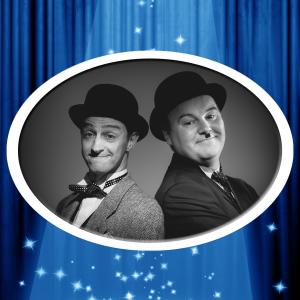
I bumped into these chaps at last year's Fringe, and I told my children that 'they' had been on TOTP, at which point Stan & Ollie spontaneously broke into song – Lonesome Pine of course. So I was looking forward to seeing the show this year.
In essence Tony Carpenter (Stan) and Philip Hutchinson (Ollie) bring you the life stories of the most famous, and perhaps best-loved comedy duos of all time. There are details from their early lives and exposure to vaudeville and music hall which stirred their ambitions. There is also their contact with other unknowns such as one C Chaplin for whom Stan was an understudy. It all points toward, as is often the case, a chance meeting and the rest as they say is history. Except this show isn't just history.
The story is lovingly told by two fans of the original duo. Tiny gestures and vocalisations are spot on and there are nice little re-enactments of some of Stan & Ollie's most famous sketches on video. And the dancing. Yes, dancing. I don't think there was a single member of the audience who didn't love that. In fact, I don't think there was a single member of the audience who didn't love the whole show. Comedy, fact and pathos in roughly equal measure it is a fitting tribute to Stan & Ollie.
This was sadly their only show at this year's Fringe and it was also one of the last shows in Underground Venues and the Pauper's Pit before the scheduled redevelopment. Whatever form it might return as, let's hope air conditioning is included!
Ian Parker Heath
HIDDEN MOTHER - The Off-Off-Off-Broadway Company
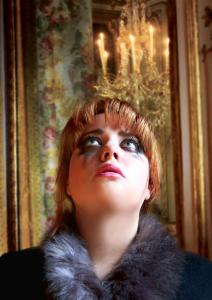
The Off-Off-Off Broadway has built up a unique body of work for its dream-like, slightly decadent fantasies, and in their latest work, Hidden Mother, despite the absence of the company’s regular muse, Jaacq Hugo, the same tone remains.
Laura Louise Baker plays Dianna, sashaying onto the stage as a Russian cabaret chanteuse, vamping it up for the audience with the help of her accompanist, Leon (writer Polis Loisou). It soon becomes apparent that this is a fantasy, or an imagined memory from a fictional past, and Dianna and Leon are in fact inmates in an asylum (I use the term, as it is the one used in the play). Within the walls of the facility, they provide a co-dependant partnership, bolstering each other’s fantasies against their drab surroundings. But when government cutbacks lead to the closure of the asylum, their comforting fantasy is about to be destroyed.
The play is witty and touching, and both performances serve the writing well – Baker the more dominant, but her larger-than-life chansonnier persona masking a much more mundane and sad truth, and Loisou providing solid support as any good accompanist should.
Ultimately the play is a reflection on the things we all need to provide us with some form of reassurance, like the ‘hidden mother’ that Victorian photographers used to calm restless infants. Dianna has her Russian fantasies to keep her safe in the asylum, but ultimately in the cold reality of the care-in-the-community world, you begin to wonder whether even the asylum itself – and her friendship with Leon – was also another layer of comforting illusion.
Robbie Carnegie
HITTING THE WALL - Heart Of Oak Theatre

Hitting The Wall is the story of Wayne Soutter, a 41 year married old dad of two, and his attempt to cross the channel between Scotland and Northern Island; otherwise known as ‘The Mouth of Hell’. A highly dangerous, potentially deadly feat; that no one has completed either before or since. Twelve men have walked on the moon but he is the only man to complete this challenge. Tom Williams plays Wayne and Matthew Warburton plays Paul Greenhaulgh, his friend and part of the support team. Matthew also wrote the play which is based on a series of blogs and interviews between Wayne and Paul.
I have to be honest and say that I my heart sunk when I walked into the Pauper’s Pit to find a lap top and screen set up. It looked like it was going to be a lecture. But when Matthew Warburton and Tom Williams greeted the audience with jelly babies, we became an audience to and part of a fascinating story. There was real warmth to the story telling and the audience were swept along on the journey. We were asked at one point if we would have pulled Wayne out of the water. I wanted to say “yes!” I have never understood what drives endurance athletes but this story gives and amazing insight into that determination and sheer bloody mindedness.
It was the most interesting and informative ¾ of an hour that I have spent in a long time. It was a presentation of a factual event by actors who weren’t seemingly acting they were reading partly from scripts, supported by facts, photos and maps on a screen behind the pair. Williams donned a woolly hat and pair of goggles and became totally believable as Wayne Soutter the crazy South African. The performance is based on blogs and interviews with Soutter and Greenhalgh and asks why we choose to do things that might better be left undone. It explores what drives people on.
You hold your breath, you will him on. You want him to stop. You are taken on the journey with the two men you are part of the pain and the determination. A fascinating, factual piece of drama.
I haven’t mentioned the jellyfish. Wayne hated jellyfish. I hate jellyfish. I do however, like jelly babies.
Jayne Marling
HUMAN - Little Glimpses Theatre Company

Sometimes as a reviewer you wonder if you’ve come to the right show. As I entered Underground Venues I found that the show, Human, was sold out, and out of that audience, only myself and three others were men. Here we go, I thought, put this in the drawer marked ‘Women’s Show’.
Human is so much more than that. Yes, the script, by Colette Kane and Helen Rutter, makes jolly references to school runs and waxing, but this is in a sense a smokescreen. It is apparent very soon that this solo performance, impeccably delivered by Rutter, uses the clichés to mask its more serious intent. Rutter plays Jo, an apparently sparky young mother, whose brittle good humour hides the psychological scars of terrible guilt. Gradually, the layers of Jo’s story are peeled back, the imperfect nature of her reminiscence gradually giving way to the awful truth.
Occasionally this structure makes the narrative slightly confusing – I particularly began to lose track of a host of children called names like Stan, Frank and George. That said, the script’s final musings on sin and humanity were ultimately profound and very moving. However, Helen Rutter’s wonderfully nuanced and truthful performance is the glue which holds this show together, a performance that will stick with an audience long after the show has finished.
Robbie Carnegie�
IN THE FUEHRER'S FACE - Gloves Off
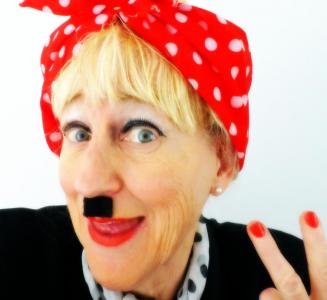
Tuesday, 19th July at 8:30pm, Underground Venues.
Patricia Hartshorne returns to the Buxton Fringe with her one-woman cabaret - a mix of the comic and the surreal, the poignant and the very dark ... Who did get in the face of Adolf Hitler? Got up his nose? Gave him one in the eye? But can we laugh at him? Are we the wrong crowd?
This was a thoroughly engaging, well written and well researched show which fully caught the attention of the enthusiastic audience for an hour. Patricia Hartshorne is a most talented story teller with a friendly, conspiratorial tone, and an expert cabaret-style singer. The material, while not to everyone’s taste, is, in the words of the author, about someone we are unlikely to forget, and whose ideas have a faint but unfortunate resonance even today.
Dressed in military-style gear (with a small surprise below), jackboots, and pencil-moustache, Hartshorne takes us through some highlights, if that is the word, of the Fuehrer’s time as the leader of Nazi Germany. The tone is by turns funny, serious, and very sad. I learned a lot of Hitler trivia, as well as contemporary information (about Chaplin, Dietrich), something about Mugabe’s moustache, and some very moving accounts of people who…well, got in his face: the Yorkshire farmworker, the Spanish double-agent, the unwittingly heroic Welshman found at sea. Strangely, one of the saddest moments for me was the account in song of Eva Braun’s marriage and lack of a honeymoon.
Which brings me to the songs: accompanied in recordings by the excellent John Miles, the predictable cabaret/slapstick numbers, complete with raspberries from the audience, are there, but less expected are a note perfect version of Lotte Lenya’s ‘Mackie Messer’ and a spine-tingling version of Anna Marly’s ‘Complainte du Partisan’, complete with eerie whistling pregnant with meaning. In the words of the performer, check them out on Youtube!
I loved the switches of tone in this show – you will have to see it to understand what I mean. And if the performer almost lost the plot towards the end – well, as she said, so did he! In the end, this show will make you laugh (especially at the end).
This performance continues until the 21st July at 830, and on the 22nd at 715 pm. I highly recommend it to you.
Ian Hamilton
IS IT TABU? - Under Two Floorboards
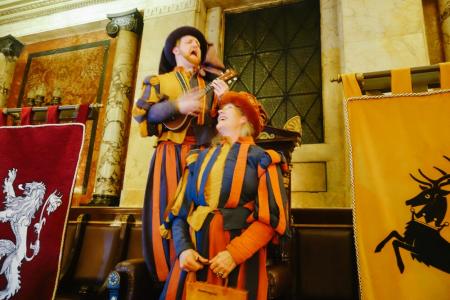
6th July 2016
A fortune teller’s table is set to one side of the stage complete with a bejewelled skull, tarot cards, a vase containing 3 white roses and a plastic pineapple. A Yamaha keyboard is stage left and upstage is a backdrop asking the question ‘Is It Tabu’. The scene is set for an improvised musical!
I had no idea what to expect from the ex Hi De Hi actress Rikki Howard and Roman Bloodworth an out of work actor (he trained at the Royal Academy of Doing Acting don’t you know?) Roman is the musician of the group and accompanied the songs on keyboard and ukulele. Rikki plays a mean pineapple.
It isn’t a deep and reflective piece of drama, it is, however really good fun and really interesting to watch the two performers play off each other. The audience interplay is confident and funny.
As with all staged improvisation the audience is never 100% sure how much is planned. However, this has seemingly genuine moments of “where is this going? Is anyone going to say anything?” That said it is still a genuinely funny piece. The two performers work really well together. There is an élan about the work and the dance adds an element of clowning.
Roman said that an audience will forget the first three minutes of any theatre performance…not possible with the start of this show. You may want to forget the first three minutes but find you cannot! It did set the tone for a silly evening.
This is a good fun piece that didn’t really take the audience anywhere deep and meaningful, but it was a fun journey with many highlights. This evening the question of where are all the people in Buxton during the day, was answered (it’s not where you’d expect!) Who knows what huge topics of the day they will cover in their next show…not them!
The plenary went on too long “What have we covered today?” In the summing up of the piece we were reminded that that evening’s experience had covered the topics of shame and illusion through the mediums of music, dialogue, monologue, contemporary dance and musical theatre. I think this performance would have benefited from a shorter run time but I thoroughly enjoyed it.
Is it Tabu? Who can tell, but it is an entertaining romp!
Jayne Marling
JACQUES BREL: A LIFE A THOUSAND TIMES - Far West Theatre

The Green Man Gallery, first night 8th July
Jacques Brel was weird; a unique talent with a dark side. After a ‘dull’ childhood he had a performing career of just fifteen years during which he wrote songs about relationships, passion, prostitutes, death and love. All contain an intensity which you just know is real. That his songs are still performed today shows their endurance.
The performing space of the Green Man Gallery is intimate and comfortable for such a show as the performer, Simon Pennicott, is mostly within arm’s length throughout. In fact he starts the show moving around the small stage with a cigarette and glass of wine in hand – a comfortable start as, included in the ticket price, the audience was sipping its own glass too.
Simon does nothing less than take us on a biography of Brel’s life told through monologues and Brel’s songs. In one anecdote about Brel’s dislike of inauthenticity, singers miming and such, he describes how during a performance in Paris there was a power cut but he nonetheless continued the show in darkness This was apposite as Pennicott’s scheduled co-performer, Babette Bell, suffered injuries prior to the show preventing her performing. Pennicott transformed the show into a single hander – a daunting task one would think as there must have been as much dialogue as in Hamlet.
Pennicott’s delivery of the songs was adapted to the theme – there were quiet moments where he played his own accompaniment on piano, and at other times, songs which struggled a little with a loud musical backing. However Pennicott ripped into the better know classics building to dramatic crescendos holding nothing back. Most songs were in English (his own translations) but the real triumph of the evening was the songs sung in French – notably Ne Me Quitte Pas. Perhaps more could have been done untranslated, as Pennicott indicates in the programme notes the difficulty of conveying the full range of feeling in a second language; and he certainly relishes the French lyrics.
Eventually after stories of mistresses and marriages we reach the end of Brel’s life, at just 49 with the appropriate ‘Le Moribund’ and the end of an evening which was not a memorial but a celebration of one of Europe’s most influential musicians.
The first night was almost full and there are only four more performances (13th,17th,23rd and 24th) for what is already becoming one of the ‘hot tickets’ of this year’s Fringe.
Brian Kirman�
JANE AND LIZZY - Nonesuch Theatre Company
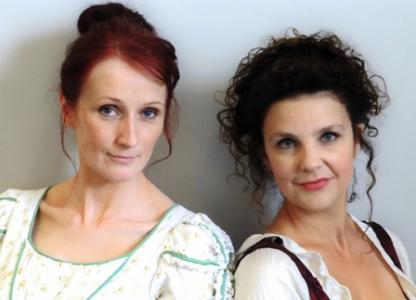
Arts Centre Studio, 16, 17, 20 & 21 July
This reworking of Pride and Prejudice allows us to consider two things. Jane Austen never married, of course, but so much of her writing is about romance and marriage (not the same thing, plainly). So what might her fiction tell us about her own thoughts and hopes when it comes to love and men?
The second theme is a representation of Lizzy Bennet's feelings in a style and language more akin to 21st century sensibilities. This is achieved by having an actress arriving for a performance of Pride and Prejudice. She is to play Lizzy. It is evident that she is slightly agitated and irritated - in a way that Lizzy is at times - but that finds expression in mild swearing and blasphemy. The distinction between the 19th and 21st centuries is clearly drawn for us.
It is soon apparent that the spirit of Jane Austen (Elisa Cowley) is in the room and for the rest of the play we have a mixture of dialogue between Jane and the actress and scenes from a production of an adaptation of the novel involving Lizzy (Bekah Sloan) and her various suitors. For the actress there is some frustration about the way in which the author (Jane) manipulates things - withholding information or introducing plot twists - to reveal Wickham and Darcy (Tom Burroughs plays both and Mr Collins) in particular in a different light. She complains to Jane that she really does not know what is expected of her or how she should respond or react.
In the end she concludes that this uncertainty reflects Jane's own view of men and the relationship she hoped for but never achieved. Jane, she argues, wanted a man whom she came gradually to admire and to love but real life never matched her fiction.
Jane, on the other hand, wants to know what it was like to be married to Darcy - she had created a situation but her lack of real-life experience makes it difficult to imagine how Lizzy would feel after 10 years of marriage. Would she still love and cherish her husband, would she mould him to make him better?
"Lizzy" with her 21st century perspective seems cynical to Jane who had hopes for romantic love and perhaps by never marrying avoided having those hopes dashed.
There is much to enjoy in this production: the scenes between Lizzy and Mr Collins, Wickham and Darcy are well and authentically done and the anxiety that Jane feels about her creation that is outside her control is believable. The cast is uniformly good and the often rapid changes of character are handled smoothly and confidently.
Keith Savage
LEST WE FORGET - Aulos Productions

Opening here in Buxton and then going to the Edinburgh Fringe, this new play crams a great deal into its short duration, planting rich thoughts and ideas but – quite rightly – leaving us without easy conclusions.
As it begins, and indeed running through it, is a theme which is particularly apposite now, as we remember the commemorations of the Somme offensive, the great ceremonies at Thiepval, the television pictures of the Commonwealth War Graves with their rank upon rank of Portland Stone headstones in their dignified garden setting. In fact it wasn’t long before I was remembering Robert Edric’s novel “Field Service”, rooted in the on-site work of the Commission.
At the start, we see a representative of the Imperial War Graves Commission trying, not for the first time, to persuade a mother to allow the body of her son, killed in Flanders, to be buried and commemorated there in the Somme region, instead of at home in the long-standing family plot. The mother is adamant. “He was a hero, I want him near me”, and of course she wasn’t alone in this.
As the play develops, layers peel away and undercurrents are exposed, sometimes dangerous ones. What is duty? What is a hero? Who was a hero? What about the daughter who served in the VAD and, through some of it, had rather a jolly time? Or the son, whose asthma left him out of the fighting forces but allowed him to work on war supplies here in England? Or the Irish fellow soldier who fought alongside the son and has alarming stories to tell about the fighting – and the son - and then goes on to reflect on ‘duty’, not least faced with the continuing Irish War of Independence.
It turns out that they all have their own rich stories to tell and truths to expose, and the script develops them well and persuasively, with convincing dialogue.
Two chairs, two tables and a hatstand, and a set of eloquent histories. The cast of five worked well on this tiny stage which never looked or felt crowded, and a central tableau scene, with a particularly effective change of lighting, allowed each one in turn to hold or wear the dead soldier’s army jacket, to stand away from the narrative, and deliver a short reflective and personal character commentary.
Of the acting company, Sophie Harris as the mother had done enough to age up but seems to have been directed right down to the detail of every facial twitch and eye movement: from the start I felt there were just too many of these and they set her apart from the measured calmness of the others who all, for all that, also have their ghosts to accompany them. Rob Younger as the Irish soldier Martin was particularly strong and at ease, especially in his haunting longer speeches.
Strongly recommended.
Michael Quine
�
MRS OSCAR WILDE - WildWolfe Productions

Underground Venues 7, 9 & 21 July
Those of us of a certain age are broadly familiar with the life of Oscar Wilde - especially the homosexual relationships that led to his humiliation and disgrace. Less well known is his marriage and his relationships with his wife and sons. In part this is because those relationships for Wilde proved to be fairly short-lived and almost marginal. For his wife, Constance, and two sons, Cyril and Vyvyan, the consequences of being part of Oscar's family were permanent and inescapable.
This new one-woman show I assume to be written and performed by Lexi Wolfe and it takes the form of Constance reading aloud a dozen or so letters written to Otho. Constance Lloyd is in her early 20s when we begin. She is unmarried - in part because any proposals she receives are from loathsome men. She is also a feminist - supporter of the Dress Reform Movement, a campaigner for women to stand for parliament and hopeful that 'ladies' should have the same higher education opportunities as men. So it is not surprising that she was quick to reject the advances of more traditional Victorian men.
She had known Wilde for a few years before he proposed and she accepted. They married when she was 25 - though her family doubted that Wilde would make a good husband. In the short term all was exciting and blissful. They married in Paris and Constance wedding dress was much admired. Soon they a much-loved son, Cyril, who was killed in the First World War.
A second son, Vyvyan, followed a year later. He was sickly and less easy to love (though lived to be 80). His birth, in 1886, seemed to coincide with a deterioration in the marriage.
Wilde, of course, became involved in a series of scandals spending less and less time with his family. Constance became depressed and isolated, crushed by the pain, shame and humiliation of loving a man unable to return that love. Constance developed an illness never properly diagnosed: it might have been syphilis, it might have been multiple sclerosis. She died in Genoa aged 39 following surgery.
The play suggests that Constance did not regret her life but recognised that she would be defined and remembered through her marriage to Wilde. Some of her other ambitions and achievements are outlined her but because most of the letters are about Oscar the play doesn't really live up to its promise and give a fuller picture of her life.
That said "Mrs Oscar Wilde" is engaging and adds a dimension to the Wilde story; it will be enjoyed by anyone who has the slightest interest in Victorian literary or social history.
Lexi Wolfe gives a fine performance as Constance. With the minimum of props she keeps our attention for 50 minutes, subtly tracing the development from youthful optimism to an all too early emotional and physical defeat.
Keith Savage
�
MY BRILLIANT DIVORCE by Geraldine Aron - library theatre touring company

This one-woman show, written by the prolific Irish playwright Geraldine Aron, was first performed as far back as 2001, and has had a good many outings on stage in this country, and abroad, as well as on radio: it was nominated for an Olivier award in the West End.
But it’s by no means dated. Its one on-stage character, Angela, finds out, to her total surprise, that her husband is packing to walk out: he does leave, abruptly, and divorce proceedings start – and drag on - while she can’t really believe it.
The clue to the play, I suppose, is that Angela is unready for anything. “After decades of being a wife and a mother, I no longer have a role in life”. For a start, the young-adult daughter had seen it coming, though it caught Angela unaware: and then as the piece develops we hear tale upon tale of woe – every adventure, ambitious or otherwise, turns into woe of some kind, narrated to us, however, in a way which makes them all seem amusing in hindsight. The first meeting from a dating site, the encounters with friends, the daily visits to the market to buy poor quality veg just so that someone will talk to her, the venture into a the sex shop, the lack of sympathy from her mother … and on it goes.
We understand, we feel for her, and sometimes we laugh in commiseration.
There is some clever text: we hear of the comments on the departed husband – Mina, the (rhyming) cleaner, and later on her friend “Lina, also a cleaner”: OK, not specially clever but neatly written: there are a good few one-liners which bring us down to earth with neat observation – for instance how the departed husband “got custody of most of our married friends”, how, divorced, you’ll never find the toilet seat up.
It’s not really a play, more like a narrative stand-up event, and in this no-scenery setting one hour 20 was for me rather too long. Perhaps that is because Deborah Kelly played it as for a more formal space, making no real opportunity for eye contact or engagement with the audience. She was telling a story, albeit in the first person, and not her story. I felt that the stand-up nature of the piece would work better addressed more immediately and directly to the audience, actually playing for a reaction, especially in a small Fringe venue. It would have brought us nearer to the woman and her feelings, perhaps emphasising the astute combination of loneliness, mis-placed hope, jealousy and (on occasion, growing resignation).
Michael Quine
NONSENSE & SENSIBILITY by Tom Crawshaw - Three's Company & Anonymous Is A Woman

The early Victorian interest in fossils is well known. The fact that Jane Austin shared this interest in her later years is less widely known and the discovery of Jane Austin's first draft of the Jurassic Park script is the positive revelation provided by Nonsense and Sensibility. In the style of Pride and Prejudice and the Zombies, an alternative title for this this enjoyable romp could have been Sense and Sensibility and the Dinosaurs.
Nonsense and Sensibility is a play within a play with two actors performing the lost Jane Austin script and playing all the parts. It uses the classic comedy theatre device of the pompous straight woman "Emma" played by Leila Sykes trying to present a serious academic work and the dim , out of control one "Harriet" played by Madeline Gould disrupting the performance by doing everything with boundless enthusiasm and failing to fully grasp the situation.
There are lots of clever Jane Austin parodies and references as well as groan-worthy (in a good way) Jane Austin puns. Both actresses play their roles with aplomb at breakneck speed and display a dizzying array of UK regional accents to distinguish between the various characters in the script.
The production is very funny and the sell out audience loved every minute.
Alex Watts
RABBITS AND FERRETS - Beth Webb
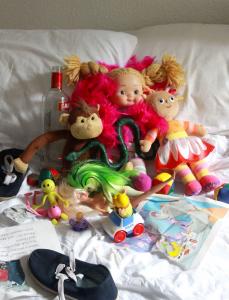
Rabbits and Ferrets is an autobiographical presentation of the author’s life-long work and experience as a social worker predominately working in the field of child neglect and abuse cases. The piece was a compilation of the experiences and stories from the author herself and the children she helped.
The problem with the piece itself, although thought-provoking and heart-felt in its intent and delivery, is that it was obvious to the audience that the form of the show was confused. The confusion was not in the content itself but in the visual format of the performance as a Powerpoint presentation for relaying information. Instead of this engaging the audience as intended, it made them feel confused about what the show was, as the presentation made it seem more like a clinical lecture than a theatrical performance.
The highlights of the piece were the powerful way Webb described and captured the trauma and abuse experienced by young children. Her empathy and life-long commitment to her work showed through her words and warm personality.
This was a thought-provoking piece of new writing, which is not like anything I have seen at the Buxton Fringe before. With an alternative format the piece would have worked much better. �
Phoebe Alderson
RETURN TO EREDURF - Cul-de-sac theatre

Tuesday 19th July at 7 pm, Scrivener’s Bookshop.
‘Help Wanted!’ proclaims the flyer, with something about reconstructing a shattered portal to a parallel universe. Whilst not exactly my area of expertise, the notion of a Terry Pratchett-inspired fantasy written by bookshop employee Janet Hopley (her first play) was an intriguing one, and it was some reassurance to see that no camels, elephants or fish had been harmed.
The premise for this entertaining show was a kind of treasure hunt around the premises of Scrivener’s bookshop, with a clue being found in a certain book on each floor. I was warned in advance to expect silliness, and there was certainly much of that: wormtubes which might just whibble you as you decipher a clue, fish which imbue you with improbable knowledge (the bigger the fish, the more knowledge, obviously), custard catching, and essence of velvet and bags of time for sale…
Jenny Mather as Miriam Nerdlane and Terry Naylor as Jeffrey Bonkerley were genial hosts for most of the silliness and they did their very best to encourage audience participation, although I must admit to being more terrified by Angela Hulme as Martha Hopscotch the noisy cleaner and Frizzina Splitendzi Borgrolli as the disconcertingly flirtatious opera singer. Natalie Ayukawa and sidekick Janet Hopley provided some fearsome militaristic presence as Ivy Corporal and Myrtle Herbly Shrubbery, and the silliness was rounded off by beard-boxing Khizil Khazal, played by Viv Midlane.
I see this as more of a performance for children than for adults, with one or two caveats – you are on your feet for a long time, for example, and it can get very hot. Children and adults alike will love the Roald Dahlesque malapropisms as well as the general silliness, and there are some references (not just some of the flirty behaviour) which will appeal to the adults, some of the names, for example, and older spectators might just catch a reference to the Steve Miller Band!
This was a well-written and conceived entertainment and I would recommend it for families – but bring some water to drink! The performance continues on a nightly basis at the same time until the 23rd July, and is advertised as being suitable for ages 8+.
Ian Hamilton.
ROMEO AND JULIET UNDERGROUND - Butterfly
Shakespeare’s classic love tragedy comes alive in the atmospheric grotto environment of Poole’s Cavern; stalagmites and their downward-facing contemporaries were probably just watery dribbles when the Bard of Avon wrote his most famous play just over 400 years ago, yet they were just as much part of the act as the cast from The Butterfly Theatre Company.
I won’t go into the plot as I don’t want to spoil the ending for anyone who has so far eluded it, but it might help to know that the story revolves around two forbidden lovers and the way in which they hide their love from feuding family members. You’ve got to expect a particularly bumpy ride with a storyline like that!
Not being a great fan of Bill’s works, I challenged myself to follow the plot unaided and put my difficulties with Ye Olde English aside. This demanded a great deal from the actors as I would be seeking significant non-verbal clues to let me know what was happening as the play progressed. They didn’t fail. They excelled and even overcame the roaring river running alongside the pathway.
My patient ears (Will’s words!) were charmed by the wonderfully resonant acoustic harmonies. The actors mastered the scene and the drip, drip, drip of the watery Verona catacomb that the Cavern had become – you have to hand it to them performing in hidden thermals, walking boots and wellies!
Please note that the cave can feel quite cold and maybe wet underfoot – warm clothing and stout, good gripping footwear is advised.
This specially abridged version was passionately performed in the most wonderful place and the audience were occasionally involved and politely walked-through the fine line between love and hate by a cast of very capable players.
David Carlisle�
SHAKESPEARE'S AVENGERS ASSEMBLETH: AGE OF OBERON - Drake's Drummers Theatre Company
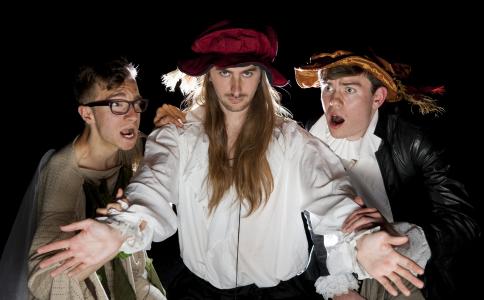
Shakespeare's Avengers goes at breakneck speed and has a lot of good jokes. The script sends up Shakespeare's plots, sends up Shakespeare's characters, sends up their own stage set as well as sending up a whole variety of cultural references. The plot involves the kidnapping of Shakespeare by Oberon and Puck to gain possession of the Infinity Quill whose power is make people to believe that any story that is written with the quill is genius however far fetched that story might be. Brutus, Macbeth, Hamlet and Ophelia attempt to rescue Shakespeare but there are a few personality conflicts along the way.
The one liners come thick and fast and the all the actors are adept with comic timing. They reminded me at times of a cross between Monty Python and Mel Brooks. Plum Grosvenor Stevenson (yes that is really his name) plays Hamlet and Oberon, Adam Toon plays Shakespeare and Ophelia, Callum Moffat plays Macbeth and Puck and Jack Tiltman plays Brutus and Peaseblossom. The play was written by Plum, Adam and Callum.
The production is very rough and it is bonkers but it is the funniest and cleverest show that this reviewer has seen so far on the Fringe
Alex Watts.
SKIN OF THE TEETH by Anna Beecher - FAT CONTENT
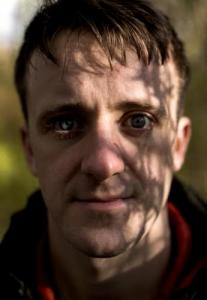
The tight-knit, subterranean Pauper’s Pit provides the perfect setting for Anna Beecher’s affecting piece of New Writing. Skin of the Teeth masterfully evokes the atmosphere of a communal, ritualistic storytelling, the audience kept close and compelled like a tide under the moon.
We follow the story of Nicolas, a young man who desperately wishes to ‘shudder’, to feel fear. Nicolas is portrayed with sensitivity and commitment by Daniel Holme. Holme is able to subtly command the stage even whilst playing a character who is vulnerable and all-too-easily manipulated. It is ironic that Holme’s riveting performance and Beecher’s absorbing, artful script – as well as some flawlessly executed lighting and sound effects – inspire in audiences the very sensations that Nicolas is seeking, what he calls ‘the creeps’. Particularly gripping is the moment Nicolas describes a large crowd in a city centre and the details Beecher chooses to include: food stands, women selling roses, a man with balloons for the children.
The ambiguity surrounding whether Nicolas’ tale is set in our world or a subtly different one led to a few moments of confusion and disenchantment on my part, however, these did little to fracture a wonderfully crafted atmosphere.
I would recommend Skin of the Teeth as a reminder of the fact that sometimes the best stories, the ones which make us ‘shudder’, can be whispered rather than shouted.
Lilly Posnett
TOP TABLE by Richard Stone - Gekkota Arts

Have you ever been at a wedding and wondered what is being said in the whispered conversations between the groom and the best man as they stand awaiting the bride, or what the father of the bride’s sentiments are towards the groom, or even what the bride and groom really think of each other? Richard Stone’s play, ‘Top Table’, invites you to be a fly-on-the-wall at the wedding of Lisa and Martin and gives you an insight into their innermost thoughts on the big day.
As the ‘congregation’ (audience) arrived at the wonderful and appropriate venue of Spring Bank Arts Centre, a beautiful converted church in New Mills, each person was greeted with “Welcome to the wedding!” On the stage, the top table was laid out, the wedding cake in pride of place at the centre, setting the scene instantly. Furthermore, the audience was also invited to sit at the other two long tables running from the stage, also bedecked in burgundy table runners and carnation posies (congratulations to Laura Stone as Designer/Stage Manager). Many of the guests had made a special effort and were dressed in their finery, buttonholes and all. This all contributed to the anticipation and excitement of what was to come and fostered the sense that we were all part of the occasion. This feeling was nurtured by being offered a glass of Bucks Fizz as we sat — a nice touch — and proffered a programme in the style of an order of service.
The lights dipped and the organ music filled the room as the show (wedding) began. From this point on, you forgot you were in the audience and, instead, became absorbed in the scene playing out before you — Martin, the groom (played by Ryan Mitchell), and his best man (Chris Milward) at the altar, awaiting the arrival of the remainder of the wedding party.
The primarily young cast from Pomegranate Youth Theatre and Gekkota Arts demonstrated a mature understanding of what is required to bring a character to life. Both Mitchell and Milward were not afraid to embrace long silences whilst their mannerisms and expressions communicated their characters, which were then embellished through the natural dialogue. This was echoed in the performances of Rebecca Brown as the bride and Katy Dent as the bridesmaid.
However, it was during the monologues that the outstanding talent of these young people became evident. In particular, Mitchell and Brown displayed a wide range of complex emotions as they expressed their fears and explained some of the backstory to the audience. Mitchell was captivating as he described how he had felt violated following a drunken encounter whereas Brown exhibited perfect timing, engaging with audience members as she elaborated on her vows, “I will…at least I think I will…I hope I will.” This would have been even more effective should there have been additional lighting on their faces which, unfortunately, were slightly in shadow when facing the audience.
Despite these moments of pathos, there was also ample to make you laugh out loud, both through the dialogue and the physical comedy. From the bustling mother of the groom (characterised to perfection by Carole Copeland) thanking each audience member for coming, slipping something extra from her hip flask into her drink and constantly confusing actors and the characters they played (anyone remember Terrance Stamp in ‘Alfie’ or John Wayne in ‘High Noon’?) to the entertaining exploits of the supporting cast, including the scene-stealing dancing of a guest in a black mini-dress and the reluctant swaying of another, having been dragged on to dance by the mother of the groom.
Particular mention must be made of the exceptional performance by Robert Laughlin as father of the bride, who made us howl with his facial expressions (especially when he accidentally found himself cupping a body part of the mother of the groom after a trip — all done to great effect in slow motion) and ache in empathy during his soliloquy when he expresses his pain at losing his precious little girl, his whole world since the death of his wife.
Congratulations to Richard Stone, who not only wrote but also directed this play and who brought out the best in this exceptional group of actors.
Sian-Elin Flint-Freel
WAITING ROOM - All Things Considered Theatre
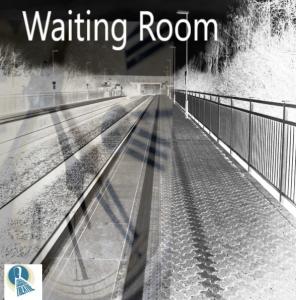
Waiting Room is a one man play where a man called Thomas shares his thoughts with the audience while waiting for a train. The author David Coggins has written a play that examines the way that we are controlled in the modern world, how we respond to those controls and how that affects our perception of what is happening around us.
Sam's Grogan's performance is mesmerising. He portrays an everyman teetering on the edge of sanity as he copes with pressures of everyday life and attempts to make sense of his feelings and maintain his values and his self esteem. Sam's comic timing brings out the humour in what are otherwise disturbing thoughts and observations. It is never made clear to what extent Thomas's statements are fantasy or reality but in the end it is a moot point because Thomas believes them to be true. Thomas is upbeat although that seems to be just a veneer and I had a sense of doom about his eventual fate and what he is waiting for.
Waiting room is a remarkable and thought provoking piece of theatre that held the audience spellbound from start to finish.
Alex Watts
WANNA DANCE WITH SOMEBODY! - Running Dog Theatre

Any show that is described as ‘part physics lecture, part dance lesson, part school disco’ has got my attention. So, desperate to find out whether ‘the hokey cokey really is what it’s all about’, I descended to the Underground Venue for Running Dog Theatre’s examination of planets, friendship and dance.
Before the performance, we were each handed a card and asked to complete the sentence “The Last Time I Danced…” which we all did dutifully, encouraging each of us to think about our own relationship with dance – but more on that later.
Walking into the room, we were confronted by Joshua Lucas, apparently lost in his own world, throwing a variety of shapes to “A Little Less Conversation”. His enthusiasm was infectious and we were soon smiling and invigorated by his energy.
“Wanna Dance With Somebody” is difficult to explain without giving it all away. However, it is an emotional, frequently funny, raw and heartfelt performance that contemplates a life of social anxiety, loneliness and the opportunities created by different possibilities — “Sliding Doors” style. This is held together by a theme of friendship and dance. The tempo varies greatly, shifting from earnest dialogue to casual storytelling punctuated by pounding beats and manic dancing or gentle swaying to romantic ballads.
Of course, the music played a central role throughout, though the simple yet effective staging and lighting (the centerpiece of which was a twinkling glitter ball) also provided a perfect environment to become engrossed in Lucas’s mesmeric performance, and the way props are introduced gradually into the story is inspired. It is no mean feat as a solo performer to keep an audience captivated for an hour; yet, despite some perfectly-timed interjections from a disembodied voice off-stage, that is exactly what Lucas managed to do.
Throughout, there seemed a gradual groundswell of appreciation in the audience for music and our capability to express ourselves through dance. Lucas’s insight of how dance has the ability to connect and unite (even if you are not the one dancing) was particularly astute.
So back to the cards we all completed as we arrived…
I, for one, will not leave it so long before I allow myself to dance like no one is watching. How about you?
Sian-Elin Flint-Freel
WAR STORIES - Breathe Out Theatre

Underground Venues 7, 12 & 21 July
It ought not to be the case but after the 1914 centenary events and those more recently for the Somme there is always the possibility that we develop a certain immunity to the horrors and tragedies of brutal and pointless conflict. However, this revival of a highly-acclaimed long-distance collaboration between Australian writer Emma Gibson and the British Rob Johnston is a valuable addition to the repertoire and the play should endure.
"War Stories" succeeds, in part, because it operates on a small scale, focusing on the histories of two people who are from opposite sides of the globe but who meet briefly. We learn something about their lives and families and the closeness we feel to them quickly binds us in.
Elsie (the excellent Verity Henry) grew up on an Australian sheep farm. She wanted to be a pirate or an explorer but girls couldn't do that - they had to be farmer's wives or nurses. "If I were a boy I'd shoot pistols and take lives - but instead I can save them." The war takes her to Cairo while her brothers and fiance go off to fight.
Bernard (Joel Parry is convincing here) is from Manchester and has enlisted. When first we meet him he is in isolation in a French military hospital suffering from memory loss. By now Elsie has made her way to Europe and is Bernard's nurse. Under her care Bernard comes to remember that he was a journalist on a Manchester newspaper and he asks for her help so that he can write again.
The play is partly about the importance of memory and story in our lives - they may be lost, returning, incomplete or freshly forming but we use them and need them to make sense of our present.
The play is a skillfully constructed mix of individual flashbacks and dialogues between Elsie and Bernard. Especially memorable is Elsie recounting how a ship she was on was torpedoed and sunk and the slaughter at Gallipoli.
The climax of the play comes as the two of them construct a new and terrible story.
"War Stories" is subtle and complex; it is beautifully written, compellingly acted and sensitively directed by Benedict Power. This already looks like being an outstanding Fringe and this will be one of the highlights.
Keith Savage
WOMEN WHO WANK - FoolSize Theatre Joanne Tremarco

First night 16th July Underground Venues
In an improvised one woman show with a title like this what do you expect? Joanne Tremarco addresses audience expectations: Smut? Humour? Titillation?
After a chatty, light start where she greets everyone arriving - for the full house - Joanne drifted easily into unexpectedly serious territory. She spent some time dealing with sex education, or rather lack of. She illustrated this with audience contributions and highlights the fact that young adults get guidance on the mechanics of sex and physical maturity but not the empowering emotional aspect. “As a girl”, one woman in the audience informed, “she was told about the mechanics of menstruation but not the psychological change” – which Joanne believes can be positive. Similarly a man related how his father asked him, “Is there anything you want to know, son?” To which he naturally answered, “No”. Joanne developed this, in her physical way, into a burden being carried and casting a shadow through life.
Other subjects covered were, FGM, rape, one night stands, how a vulva is treated throughout its life (stroked, caressed, forced, kissed, brutalised...a bit ‘Vagina Monologues’ here).
It is a little surprising to deal with serious issues in an improvised comedy show and this may sound a bit heavy and preachy but Joanne kept a light touch and there was even a pole dancing scene (she was the pole) where two game audience members (male) stripped down to pants and strutted their stuff.
Early in the show she joked that Americans didn’t understand ‘wank’ and brought their families along to her show. While not intended for kids maybe the show should be. Perhaps raising their expectations about ‘emotional’ education would be a positive thing?
That is what the show did best; raising serious issues in a humorous and entertaining way. A seriously good hour’s theatre.
Performances 17th,18th and 19th if you can find a ticket left.
Brian Kirman�



